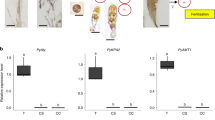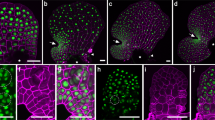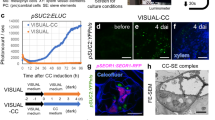Abstract
In leptosporangiate ferns the incipient vascular tissue can be observed as an uninterrupted layer situated immediately below the apical meristem from which it is derived and enclosing a central pith. In this cone of incipient vascular tissue no leaf-gaps are present. The apical meristem can be isolated from the adjacent lateral organs (leaf primordia and scales) and tissues by vertical incisions1,2. This operation involves the severance of the incipient vascular tissue, the isolated meristem being now seated on a thin layer of incipient vascular tissue and the latter on a plug of pith parenchyma.
This is a preview of subscription content, access via your institution
Access options
Subscribe to this journal
Receive 51 print issues and online access
$199.00 per year
only $3.90 per issue
Buy this article
- Purchase on Springer Link
- Instant access to full article PDF
Prices may be subject to local taxes which are calculated during checkout
Similar content being viewed by others
References
Wardlaw, C. W., Nature, 156, 39 (1945).
Wardlaw, C. W., Phil. Trans. Roy. Soc., B, 232, 343 (1947).
Author information
Authors and Affiliations
Rights and permissions
About this article
Cite this article
WARDLAW, C. Experimental Production of a Protostele from a Dictyostele in Dryopteris aristata. Nature 160, 539–540 (1947). https://doi.org/10.1038/160539a0
Issue Date:
DOI: https://doi.org/10.1038/160539a0
Comments
By submitting a comment you agree to abide by our Terms and Community Guidelines. If you find something abusive or that does not comply with our terms or guidelines please flag it as inappropriate.



